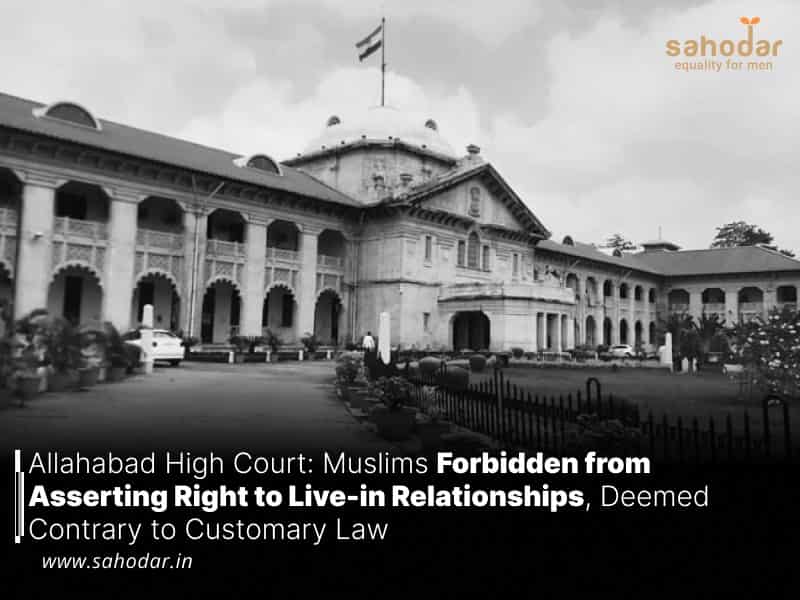The constitutional morality and social morality in the “matter of marriage institution” are required to be balanced, the Court said while sending a Muslim man’s Hindu live-in partner to her parents.
In a recent pronouncement, the Allahabad High Court delineated that individuals adhering to the Islamic faith are precluded from asserting entitlement to a live-in arrangement, particularly in instances where they maintain an extant marital bond. The verdict, articulated by a division bench comprising Justice Attau Rahman Masoodi and Justice Ajai Kumar Srivastava, was underpinned by a rationale emphasizing the regulatory frameworks governing matrimonial conduct, which span statutory provisions as well as personalized legal doctrines. The judicial elucidation underscores the imperative of affording commensurate weightage to prevailing customs within the broader legal landscape, thus advocating for parity in the treatment of diverse legal paradigms.
“The customs and usages are an equal source of law recognized by the Constitution as the law made by the competent Legislature. Once there is a recognition of the customs and usages as a valid law within the framework of our Constitution, even such laws become enforceable in an appropriate case,” the Court said.
Furthermore, it emphasized that the constitutional safeguard provided by Article 21 does not unconditionally bolster the right to a live-in relationship, particularly when prevailing usages and customs explicitly forbid such unions between individuals.
“A person reposing faith in Islam cannot claim any rights in the nature of a live-in-relationship, particularly when he has a living spouse,” the Court said.
During a hearing concerning a petition aimed at nullifying a kidnapping charge against an individual and restraining interference in the relationship of a Hindu-Muslim couple, the Court made these remarks.
However, the Court observed that the couple had previously filed a petition seeking protection of their freedom. Upon reviewing the records, the Court discovered that the Muslim man was already wedded to a Muslim woman and they shared a five-year-old daughter.
Furthermore, it was highlighted that the Court was informed that the Muslim man’s wife had consented to his live-in arrangement due to her health issues.
In the latest petition, it was revealed that the man had issued a triple talaq to his wife.
On April 29, the Court instructed the Police to produce the Muslim man’s wife and also requested his presence along with his live-in partner. The subsequent day, the Court was informed of some disconcerting revelations.
It was disclosed that contrary to the man’s claim, his wife was not residing in Uttar Pradesh but rather in Mumbai with her relatives.
The Court noted that the petition aimed at quashing the kidnapping case essentially sought validation of the live-in relationship between the Hindu woman and the Muslim man.
“This relief is sought in a situation where petitioner No.2 belonging to a different religion is already married and has a minor child of five years of age. The religious tenets to which the petitioner No.2 belongs to, does not permit live-in-relationship during the subsisting marriage.”
The Court expressed the view that the situation might vary if the two individuals are unmarried and, being of legal age, decide to live their lives according to their own preferences.
“The constitutional morality in that situation may come to the rescue of such a couple and the social morality settled through the customs and usages over ages may give way to the constitutional morality and protection under Article 21 of the Constitution of India may step in to protect the cause”.
Therefore, the Court asserted that any further continuation of the live-in relationship cannot be sanctioned without considering the rights of the wife and the welfare of the minor child.
The Court emphasized the necessity to strike a balance between constitutional morality and societal norms within the institution of marriage. Failure to do so, it remarked, could jeopardize social cohesion and undermine the pursuit of peace and harmony within society.
“Thus, the direction for continuation of a live-in-relationship as has been prayed for in the present writ petition, the Court would strongly deprecate and deny notwithstanding the fact that the constitutional protection remains available to a citizen of India,” the order stated.
Consequently, the Court instructed the police to accompany the man’s live-in partner to her parents’ residence and furnish a report on the matter.
“The Court shall next go into the question of concealment of material facts and we find that the counsel appearing in the two cases has risked at his own cost to abuse the process of law,” the Bench said while listing the matter for further hearing on May 8.

